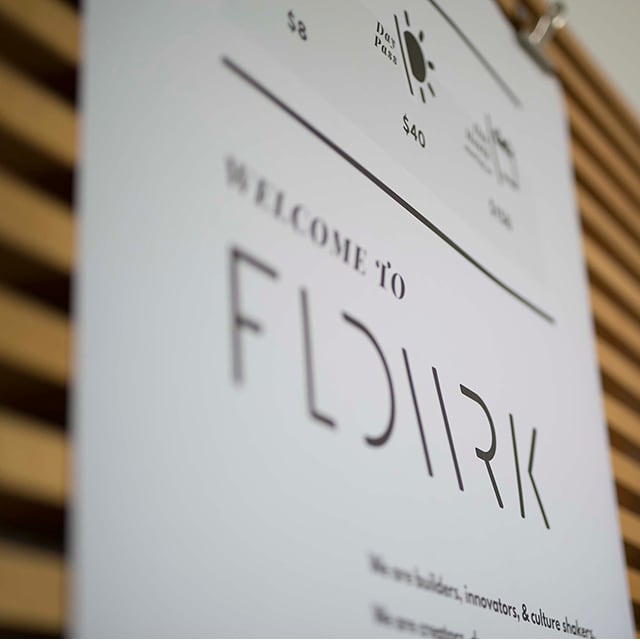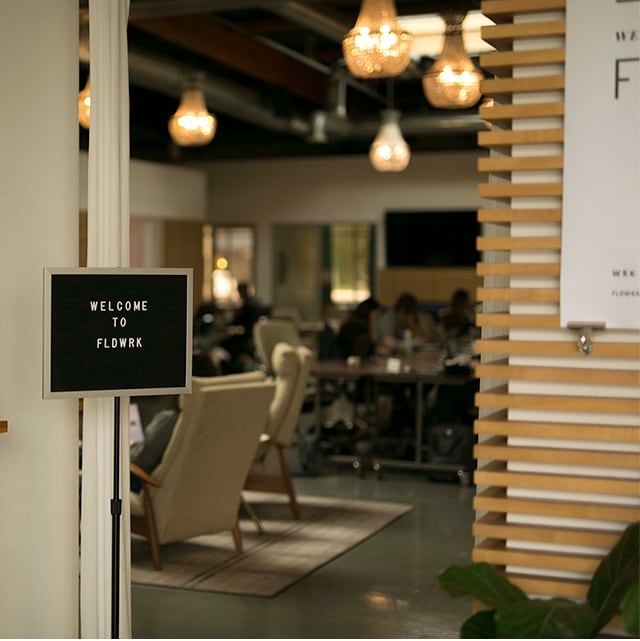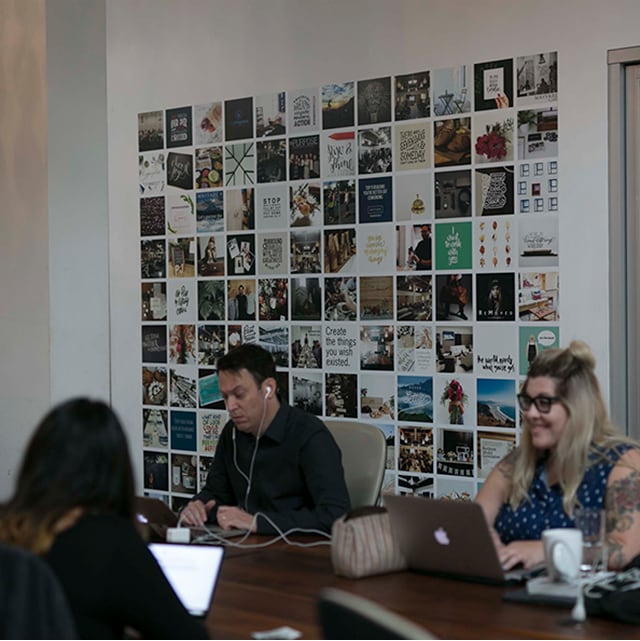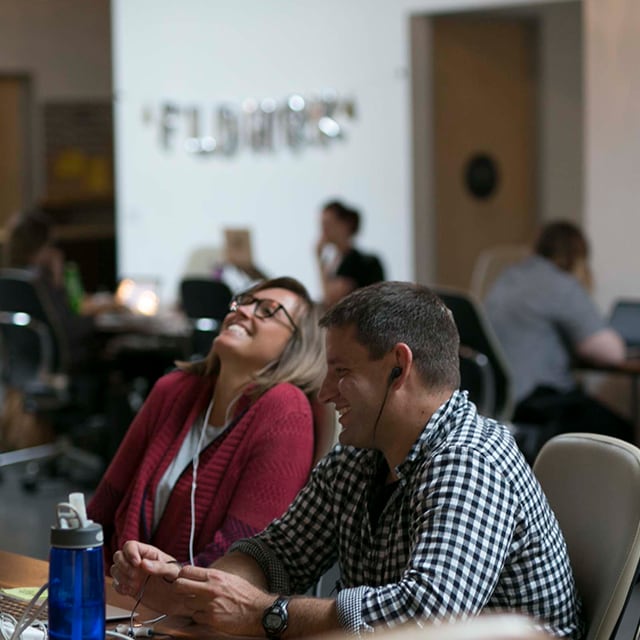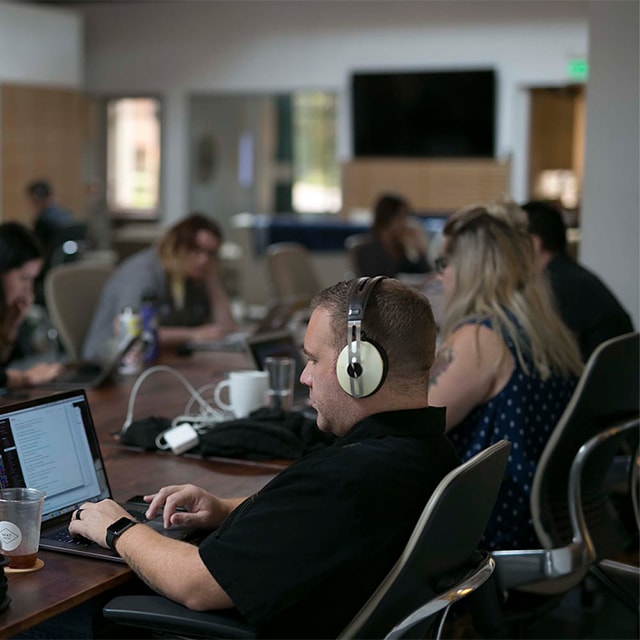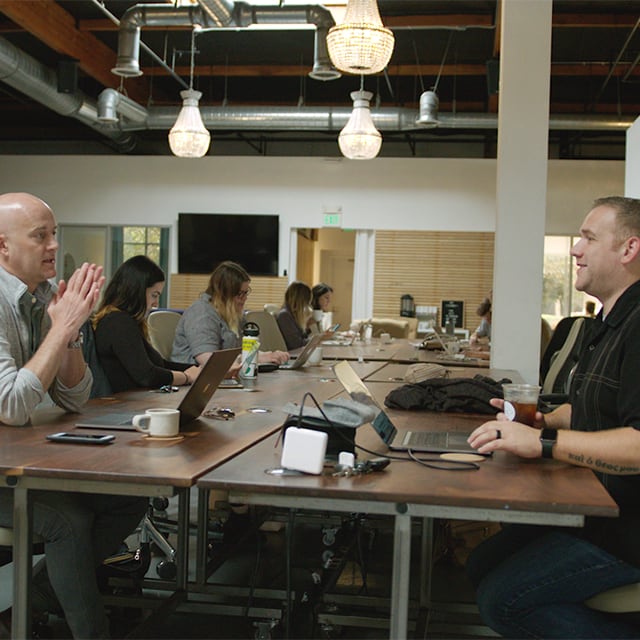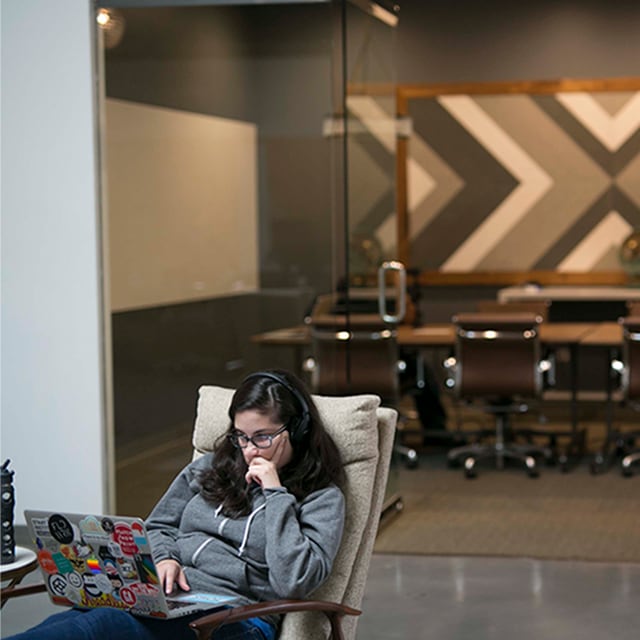FLDWRK
Coworking Spaces
Brandon Arbini ’01 and Jeff Tanner ’96, M.Ed. ’99
This article, written by Caitlin Gipson '01, was originally published in the Spring '16 issue of APU Life.
“What if the Church became the human incubator for the world’s best future?” pastor Erwin McManus asked at Q Ideas 2013, Christianity’s answer to the TED conference. He continued speaking, but for two audience members, everything stopped. Brandon Arbini ’01 and Jeff Tanner ’96, M.Ed. ’99, left the conference contemplating that question. What does it look like to partner with God in His restoration of the world? What kind of support do believers need in order to create world-changing movements?
Over the ensuing months, these seeds grew into FLDWRK coworking spaces and the Sequoia Collective startup incubator in Costa Mesa, an ambitious venture that promises to change the landscape for Christ-following entrepreneurs. Sequoia Collective and its founders provide a powerful example of the entrepreneurial environment and the connected, world-impacting graduates Azusa Pacific University strives to produce.
FLDWRK’s and APU’s focus on transformative entrepreneurship could not come at a better time. Pew Research reports that last year Millennials (adults 18 to 35) surpassed Generation Xers to become the largest segment of the American workforce. Millennials, who now comprise one-third of American workers and will represent 75 percent of the workforce by 2025, bring new expectations to their careers. A 2014 Bentley University study indicated that 67 percent of Millennials expect to start their own businesses, and a Stanford University study revealed that 90 percent of MBA students would forgo financial benefits to work for organizations that prioritize corporate social responsibility and ethics. As this generation seeks to advocate social change and address societal problems, FLDWRK stands poised to help.
Arbini took a circuitous path to FLDWRK with the full support, partnership, and involvement of his wife, Jill (Tanner ’02), beginning with roles in web design at Azusa Pacific University’s marketing department, to a Bay Area nonprofit, to lead engineer for a Wisconsin startup, to the thick of Silicon Valley’s tech startup scene. “Jill and I went through doors as they opened,” he said, “and God led me places I never expected.” Notably, He took Arbini to a startup in Wisconsin, which “failed spectacularly” but laid the groundwork for remarkable success. “That startup was a shining example of what not to do,” Arbini said. “The company had a plan A—there was no plan B.”
Later, when Arbini, fellow alumnus Steve Heffernan ’03, MBA ’08, and another colleague decided to create Zencoder, a cloud-based video transcoding software, they learned from the mistakes he had observed—they always had a plan B. Their software startup became a success, and Y Combinator, Silicon Valley’s most prestigious startup incubator, accepted Zencoder into its three-month program. The startup accelerator paired them with a mentor and provided the opportunity to pitch the product to leading venture capital firms. “Y Combinator was an incredible introduction to the startup world,” said Heffernan. “There are innumerable details and pitfalls that aren’t obvious from your living room. Y Combinator got us ready and then put us in front of big-name investors, which was like shooting us out of a cannon on our way out the door.” As a result, Zencoder secured $3 million in funding from giants like Andreessen Horowitz, Google Ventures, Founders Collective, and Lowercase Capital. The company brought in another APU alumnus, Justin Greer ’02, for back-end programming, and after two years of intense work and cross-country commutes, they sold Zencoder to Brightcove for $30 million.
While Arbini navigated the tech startup world, Tanner focused on Christian startups and nonprofits. He and fellow alumnus Lucas Baerg ’98 founded Aionova Media, a business that produced promotional videos for missions organizations. In addition, Tanner managed marketing accounts for Azusa Pacific University’s marketing department and spent eight years at the Evangelical Christian Credit Union (ECCU), working his way from marketing director to vice president of strategic services. During that time, he cofounded Reveille, a communications agency focusing on public relations and marketing for social good organizations, and served as board chair for Mika Community Development Corporation, a startup founded by APU alumna Christine (Brooks ’97) Nolf.
Tanner was satisfied in this track, until one day he heard a clear message from God. “I was at a church gathering, and clearly heard He wanted me to leave ECCU. I didn’t have another opportunity lined up, but I distinctly heard, ‘I’ll take care of you.’ So I left without knowing where I was headed.”
Weeks later, he and Arbini attended the Q Ideas conference where McManus posed that life-altering question, one Tanner ruminated on throughout a six-month sabbatical. During that period, God prepared the way for bivocational ministry and FLDWRK. Redemption Church in Costa Mesa hired Tanner as executive pastor, and through conversations with Arbini, the seeds of FLDWRK took root.
Envisioning the Church as an incubator for innovation fueled their creativity. On a practical level, that shared vision launched Sequoia Collective and FLDWRK, coworking spaces for startups and early-stage organizations pursuing the common good. The first FLDWRK location in Costa Mesa houses 75 members representing 30 organizations. Their memberships include access to workspaces, meeting rooms, and community events, with the benefit of working alongside like-minded individuals and organizations with similarly ambitious goals—to right the world’s wrongs and bring about restoration.
FLDWRK does not require coworking organizations to be run by Christians, an idea that Arbini attributes to his time at APU. “APU is unapologetically Christian, and yet does not require all students to be believers. We strive to create a similar atmosphere.”
“Many nonbelievers strive to do good in the world. We hope that they will join this community, rub shoulders with Christ followers, and the light bulb will go on. They will realize, ‘Oh, this is why I care about the world; it’s God’s plan to restore it.’”
On the other hand, Sequoia Collective, a donor-supported nonprofit, targets Christ-following founders and missional startups. Heavily influenced by Arbini’s experience in Y Combinator, Sequoia Collective provides much-needed mentoring. “Christian founders face unique challenges,” said Arbini. “Sequoia Collective provides startup expertise integrated with emotional and spiritual support.”
Jill Arbini now serves as FLDWRK’s director of events, and Baerg and Nolf sit on the Sequoia Collective board and serve in its advisor network as mentors and coaches. “It’s really exciting working with founders, helping them create systems and a plan,” said Nolf, who draws upon 12 years of experience with her own leadership development startup. “It’s rewarding to pass on knowledge and help others avoid the mistakes I made when starting out.”
Jay Sherer ’03, MBA ’07, former marketing director for Sequoia Collective and ECCU, has witnessed the impact the incubator has on its participants. “Many believers are called to achieve something, but they have no idea how to make it sustainable,” he said. “They don’t know how to create a budget, or they have a paralyzing fear of asking for money to fund their vision. Also, spiritual attacks and insecurities come with following God’s leading. Sequoia Collective addresses these areas and equips founders to succeed.”
Sherer understands this firsthand. “Not only do I believe in what they’re doing, but it also moved me to start my nonprofit, Reclamation Society, which reveals biblical truth through modern storytelling methods (comic books, books, films, and podcasts) and provides gritty, impactful stories to believers while pulling those far from God into the truth of Jesus Christ.”
This contagious creative enthusiasm, informed by a business perspective and Christ-centered conviction, differentiates FLDWRK and, according to Tanner, speaks to the larger issue: “We’re not called to live dichotomized lives, and yet that is what the Church has become in Western culture. We’ve largely relegated our faith to the consumption of Christian goods and services on a Sunday morning, and that phenomenon is so embedded in our culture that we can’t even see it.”
When Arbini and Tanner began, they dreamed that Costa Mesa would become known for Kingdom-oriented startups like Silicon Valley is for tech startups. But now that vision is expanding. According to Arbini, “We want FLDWRK and Sequoia Collective to be catalysts for the transformation of urban centers throughout the world, where participants influence culture by living out their faith in all aspects of life.”
“We believe that this idea of full-life integration reframes church planting as community planting, where people follow Jesus with their whole lives as they work alongside each other, take care of each other, worship together, create beauty, love their neighbors, challenge systems of injustice, and start world-changing movements.”
It’s happening. The first coworking space came online in 2015 and hosts 30 organizations, followed by a second space in Fullerton, California. The team expects several additional locations to come online in cities across the country over the coming years. And Sequoia Collective graduated its first class of founders this year. “FLDWRK has meant so much to me,” said Karrie Garcia, founder and CEO of Freedom Movement, a nonprofit aimed at drawing women closer to God. “Sequoia Collective allowed me to dream even bigger, gave structure to startup chaos, and helped implement critical foundational systems to lead well.”
“Sequoia Collective helps people like me with big dreams and visions come to fruition,” said Karen McMurray, founder of True Blue Science, an environmentally conscious laundry additive. “The book of Proverbs tells you to surround yourself with wise counsel to succeed. Without it, your plans are frustrated. I had investigated a few accelerator programs before being introduced to Sequoia Collective. None of them was Christ-centered, which was imperative in order for me to stay on track with God’s will and His way of fulfilling the dream and vision He has placed in my heart.”
Recently, Arbini served as a judge at Zuventurez, APU’s annual business plan competition. Current student Maritza Grissom, MBA ’16, won $15,000 in seed funds to develop her health care education app, PreceptMe, and spoke to the importance of encouragement from alumni like Arbini. “Obviously, the $15,000 was great, but the most valuable part was getting feedback from the panelists, mentors, alumni entrepreneurs, and judges,” she said. “They challenged my numbers and my marketing strategy, bringing their experience to bear. That wisdom helped me avoid mistakes I might have made, and really honed my concept.”
“APU has a tradition of successful entrepreneurial alumni answering God’s call to make all things new,” said Annie Y. Tsai, Ph.D., APU’s vice president for vocation, innovation, and alumni. “Brandon and Jeff exemplify the type of alumni that we seek to develop and encourage. Not only are they successful entrepreneurs themselves, but they also are difference makers with Kingdom impact. They use their learning to invest in the next generation of founders, both at APU and in the world.”
Related Stories
Meet Azusa Pacific University alumnus Matt Holguin ’02, MBA ’05. While at APU, Matt was encouraged to pursue both his passion for business and his calling to be a pastor. This combination fueled him to form Working to Give, a for-profit business created for the sole purpose of earning money to give it away and make a difference in the lives of others.
Zambikes employees and trains Zambians to build bicycles and bike trailers used for transportation, for taking goods to market, and for getting people to medical clinics.
Tiffany (Porter ’06) Moore sees miracles in action every day in the lives of more than 400 South and East Los Angeles students who attend KIPP Scholar Academy, the college-preparatory school she founded and leads.
